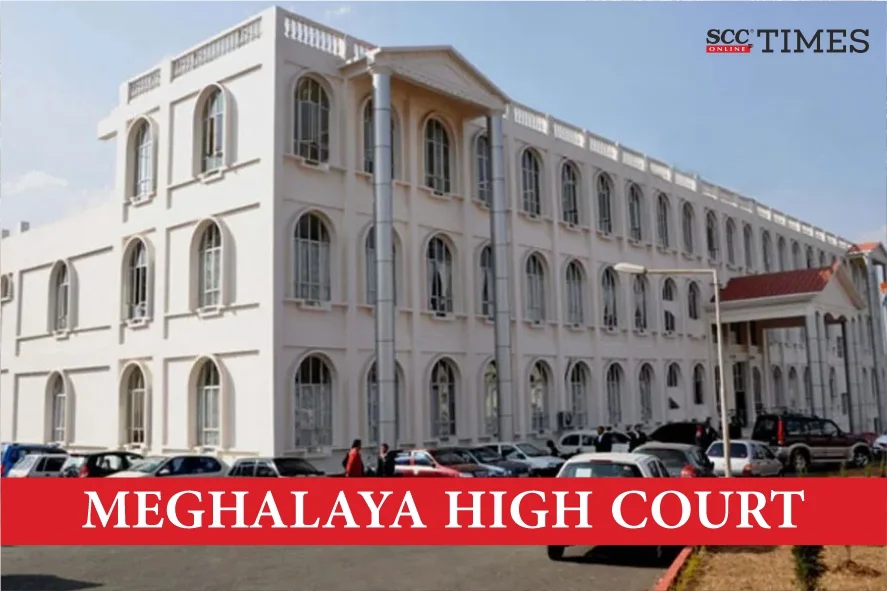Meghalaya High Court: In a criminal appeal against a decision of the Special Judge (POCSO), wherein, the convict was found guilty of offence under Section 5(m) of the Protection of Children from Sexual Offences Act, 2012 (‘POCSO Act’) punishable under Section 6 of the POCSO Act, the Division Bench of S. Vaidyanathan, CJ. and W. Diengdoh, J. dismissed the appeal and upheld the impugned decision.
Factual Matrix
A complaint was filed by minor girl’s father alleging that convict had committed aggravated penetrative sexual assault on his daughter aged about 4 years and also, raped her. Subsequently, a First Information Report (‘FIR’) was registered for offence under Section 354 of the Penal Code, 1860 (‘IPC’) read with Section 6 of the POCSO Act. The Trial Court, after analyzing the evidence, found the convict guilty of the offence under Section 6 of the POCSO Act and sentenced him to undergo rigorous imprisonment for a period of ten years and to pay a fine of Rs.5,000/-, in default to undergo simple imprisonment for six months.
Decision
The Court noted that the minor girl was aged about four years only at the time of incident. The Court on perusal of the minor girl’s statement, said that the accused had deceivably called the minor girl to his house and raped her by sealing her mouth. The Court noted that the minor girl had narrated the incident to her mother. The mother had stated that when the convict’s act was reported to his father, he, instead of condemning his son / convict pacified her. The Court on perusal of the medical evidence, noted that it was duly established that the blood trace belonged to the convict, and the pubic hair also belonged to a human.
The Court said that there was no missing link or discrepancy in the prosecution case and there was a proper corroboration of statements of witnesses with the documentary evidence. Therefore, the Court said that it was the accused, who molested the minor girl. Referring to State of Punjab v. Gurmit Singh, (1996) 2 SCC 384, the Court said that when the testimony of the victim child inspires the confidence of the Court and is found to be reliable, there is no necessity to look for other corroborations.
Regarding the contention based on Section 7 of the POCSO Act, that there was no penetration into minor girl’s vagina and the convict had only touched her private part with his penis, the Court said that such interpretation cannot be accepted, as it would signify that the private part of a female can be touched with penis and only insertion in the vagina is impermissible that will alone amount to commission of offence, which is not the intent of the provisions of the POCSO Act.
The Court said that Section 3 of the POCSO Act explains penetrative sexual assault and Section 3(a) of the POCSO Act makes it clear that there is no requirement that the penis should have completely penetrated the vagina. The Court observed that at tender age, there is no possibility for a child to have an idea about a sexual assault and according to the child, a physical assault like hitting or pinching is a matter of concern. The Court held that minor girl was four years old at the time of incident and hence, the offence of aggressive penetrative sexual assault was clearly established under Section 5(m) of the POCSO Act, which is punishable under Section 6 of the POCSO Act. Hence, the Court dismissed the appeal holding that the impugned decision did not warrant any interference.
Further, the Court remarked that why Police had not booked a case against the family members of the accused, more particularly, father of the convict, who, disbelieving the words of the mother of the minor girl, concealed the convict in his house and informed her that he was not present in the house, which amounts to harbouring the offender, punishable under Section 212 of the IPC. The Court directed for the fine amount to be paid to the minor girl, if already not paid, in addition to the payment of compensation of Rs. 700000/- by the State to the victim child.
[Thoura Damei v. State of Meghalaya, 2024 SCC OnLine Megh 596, Decided on: 08-07-2024]









